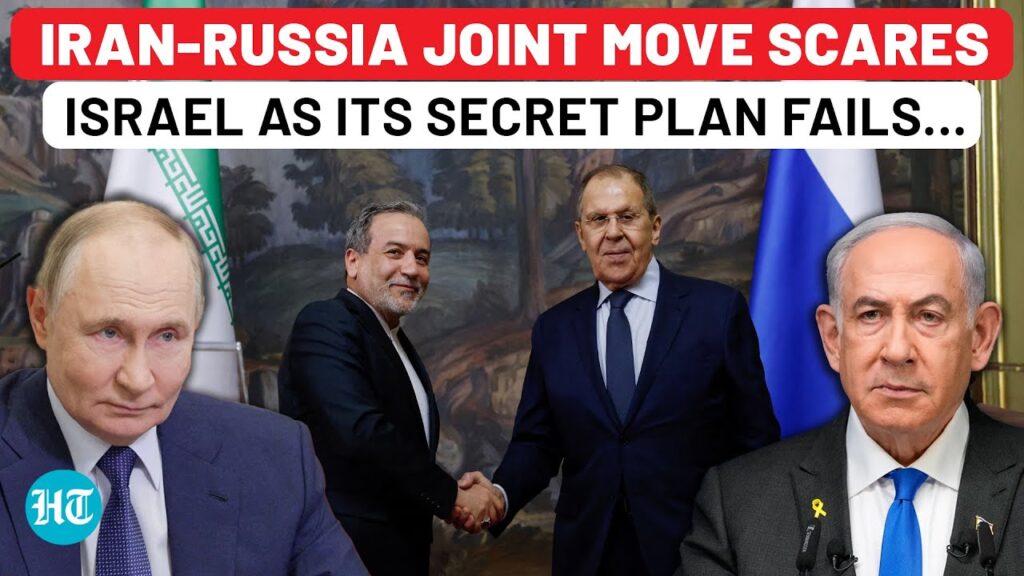Iran’s Foreign Minister Abbas Araghchi is set to meet with his Russian counterpart, Sergey Lavrov, on July 15, 2025. The high-level diplomatic engagement will take place on the sidelines of the Shanghai Cooperation Organization (SCO) Foreign Ministers’ Meeting in China. The meeting was announced by Iran’s Foreign Ministry spokesman, Nasser Baghaei, and is expected to focus on regional security, bilateral cooperation, and the evolving geopolitical landscape in Eurasia and the Middle East. INTERNATIONAL NEWS #Iran #Russia #Araghchi #Lavrov #SCO2025 #Diplomacy #China #ForeignMinisters #IranRussia #RegionalSecurity #InternationalRelations #BreakingNews #WorldPolitics #BilateralRelations #SCO #July2025

Iran-Russia’s Joint ‘War’ Plan Scares Netanyahu As Israeli Secret ‘Sabotage’ Bid Fails?| Nuclear| US
In a stunning and alarming turn of geopolitical developments, Israel finds itself increasingly anxious over growing military and strategic ties between Iran and Russia. As Tehran and Moscow intensify their defense collaboration—allegedly developing a joint ‘war’ contingency plan aimed at countering Western influence and deterring Israeli aggression—Israeli Prime Minister Benjamin Netanyahu is facing mounting internal pressure and strategic dilemmas. Adding to the tension is the reported failure of a covert Israeli sabotage operation targeting Iranian nuclear infrastructure, a move that was intended to slow down Tehran’s nuclear ambitions but appears to have backfired.
Recent intelligence leaks suggest that Iran and Russia have been sharing critical military technology, including drone warfare strategies and missile coordination systems. Their defense cooperation, once limited to tactical collaboration in Syria, now appears to be evolving into a long-term strategic alliance. Russian officials, reeling from their own isolation due to the Ukraine war, are reportedly looking to deepen ties with Iran as a means of pushing back against NATO-aligned nations. Iran, meanwhile, gains valuable military expertise, weapons systems, and diplomatic cover.
Israeli defense officials have expressed concern that Iran could soon receive advanced Russian air defense systems, including the S-400, which would make any future Israeli or U.S. airstrike against Iran’s nuclear facilities exponentially more difficult. This comes amid reports that the Israeli Mossad attempted a cyber and on-ground sabotage operation targeting a sensitive uranium enrichment facility in Natanz—an operation that reportedly failed and exposed some Israeli assets in the region.
Netanyahu’s hawkish cabinet now faces growing scrutiny over its strategy toward Iran. The Israeli prime minister has long advocated for a preemptive posture, arguing that Iran must never be allowed to reach nuclear weapons capability. However, with Iran’s uranium enrichment program continuing despite international warnings—and now backed by Russian support—Netanyahu’s options are narrowing.
The United States, while formally supporting Israel’s security concerns, is increasingly wary of being pulled into a direct conflict. Washington has condemned Iran’s nuclear advancement but is also focused on containing Russia in Europe and managing competition with China. The Biden administration has also been critical of Israel’s recent internal turmoil, particularly over judicial reforms and the Gaza conflict, which have strained U.S.-Israel relations.
Iran, emboldened by its ties with Russia and increasingly with China as well, sees this alliance as a strategic hedge against Western pressure. Tehran’s leaders have long accused Israel of assassinating its nuclear scientists and launching cyberattacks such as the infamous Stuxnet worm. Now, with advanced Russian tech and renewed funding from revived oil exports to Asia, Iran may be less vulnerable than before.
The Netanyahu government, facing economic pressure and domestic unrest, may now be forced to rethink its approach. A military strike could ignite a broader regional war, drawing in Hezbollah in Lebanon, Iranian proxies in Syria and Iraq, and potentially triggering global economic shockwaves.
In the high-stakes game of Middle East strategy, Iran and Russia’s tightening embrace is a chilling development for Israel. As the shadow war over nuclear weapons, intelligence, and regional influence intensifies, it remains unclear whether diplomacy can still offer a path forward—or whether all sides are edging dangerously closer to open confrontation.
